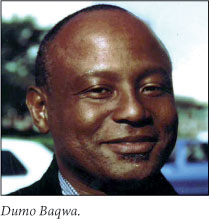Dr Jeffrey Dumo Baqwa (1949 – 2001): a tireless advocate for social justice

Dr Jeffrey Dumo Baqwa was a South African anti-apartheid activist and medical doctor. He completed his medical degree while living abroad in exile and working to raise awareness about the injustice of apartheid in South Africa. Dr Baqwa was the first professor of primary healthcare in South Africa.
Born and raised in Pinetown, KwaZulu-Natal, Dr Baqwa completed school at St Francis College, Marianhill, Pinetown. He then went to the University of Fort Hare, Eastern Cape, where he graduated with a Bachelor of Science in 1971. Dr Baqwa’s involvement in politics began in his university years. He was a founding member of the Black Consciousness Movement (BCM) and the South African Students Organisation (SASO). He later served as the director of SASO at its headquarters in Durban.
Because of his anti-apartheid activism, Baqwa was ‘banned’ by the South African government in September 1973, at the age of 24. This meant that he was restricted to the uMzimkhulu village in KwaZulu-Natal where he was, among other things, prohibited from meeting with more than one person at a time, receiving visitors and visiting schools.
Dr Baqwa lived under these conditions for months. This came to an end when Abram Ramothibi Onkgopotse Tiro was assassinated by apartheid security forces in Botswana and the BCM appealed to Baqwa to leave South Africa and assume control of Tiro’s task, which was to raise the profile of the draconian apartheid regime and challenge the global community to take a stand against apartheid. Dr Baqwa accepted, and in November 1974 was able to flee to Botswana.
In his new role, Baqwa travelled a great deal, particularly in Europe, and interacted with numerous international bodies including the United Nations and the World Council of Churches.
In 1979, Baqwa enrolled at Saarland University in Saarbrücken in Germany to study for a medical degree, which he completed in 1988. Following this, he went to the University of Liverpool in England where he studied for a Diploma in Tropical Medicine.
As the process for the dismantling of apartheid gathered pace, Dr Baqwa was persuaded by Barney Pityana (then director of the Programme to Combat Racism at the World Council of Churches in Geneva) to return to South Africa in 1991. This was despite being offered a post by the Ministry of Health in Fiji. On his return to South Africa, Dr Baqwa first worked for the World Council of Churches before joining the Alexandra Health Centre in Johannesburg as a clinician.
In 1994, he joined the University of Cape Town (UCT) to become the head of the Department of Primary Healthcare. His many distinctions at UCT include being the first professor of primary healthcare in South Africa, as well as being the first black African to attain full professorship in UCT’s Faculty of Health Sciences. He also served as the inaugural chair of primary healthcare.
As chair, he made significant contributions to engineering a more equitable health system through his involvement in strategic health forums nationally and locally. Sadly, he lost his life in August 2001 in a car accident.
As part of the centenary celebration of the Faculty of Health Sciences in 2012, this conference room was renamed the Jeffrey Dumo Baqwa Room to honour the rich and inspiring part Dr Baqwa played in making primary healthcare more accessible in South Africa, and his courage in taking a stand against the apartheid regime.